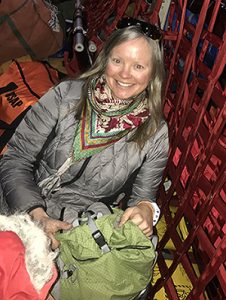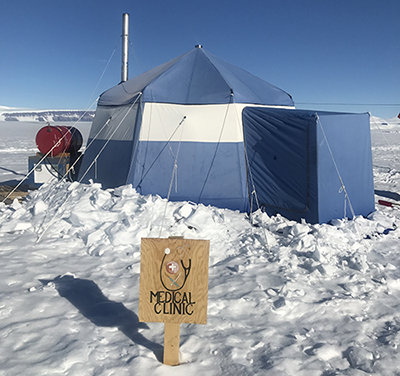PA Julie Mueller Thrives in Remote Antarctica
Provides Patient Care in Isolated, Dangerous Environments
September 18, 2018
By Hillel Kuttler

For PA Julie Mueller, Antarctica is becoming a second home, 9,000 miles from where she usually lives.
Mueller has twice spent three months of the austral summer in Antarctica to provide medical care and will return for six weeks this winter – just a year following her most recent visit. A common thread ties Antarctica to the isolated clinics where she works in Idaho, Wyoming, and Alaska.
“As a PA, I’ve always worked in remote locations. That’s been my MO,” Mueller said from her home in Victor, Idaho. As to the planet’s southernmost continent: “I’ve always had a crush on Antarctica,” she said.
“Antarctica is a singularly unique place with incredible terrain, geography, and weather conditions. It is remote, dangerous, and very, very beautiful. There is no place like it in the world,” she said. “It experiences extremes of light, dark, and cold. Life is so precious there because it is so hard to survive: for humans, plants, and animals, on land and in the sea. I love it there.”
Unique Skill Sets
In America, Mueller works in rural community health clinics, which encompass family practice, urgent care, and emergency medicine. In some locations, she takes x-rays and handles nursing duties, too.
Mueller’s embrace of remote locations, along with her medical skills, help explain why she’s been selected three times to work in Antarctica. Her collaborating physician on those assignments, Jim McKeith, M.D., said Mueller possesses a “unique skill set” as a PA with “experience in the middle of nowhere.”
“We specifically look for people [like] that, but it’s a difficult skill set to find,” he said. It’s all the more important in Antarctica, he said, given the need for medical providers who are cool-headed and experienced problem solvers, able to cope in an extremely isolated, dangerous environment, where no backup is nearby.
Last November through January, Mueller served at Shackleton Glacier Camp, one of several outposts run by the National Science Foundation’s U.S. Antarctic Program. While the United States’ three main research bases in Antarctica – Palmer, Amundsen-Scott South Pole, and McMurdo – are like small towns, Shackleton is barely a hamlet. It is a seasonal field camp. There are no permanent buildings. Residents live in tents. Some tents, such as the medical tent, the galley, the communications center, and science tents, have heat and electricity.
Spending time with world-class scientists
Researchers during Mueller’s stint included paleontologists combing the mountains that loom above the glacier for fossils. Some geologists studied the glacier and others searched for meteorite fragments. In all, eight science projects ran there last winter. Some scientists arrived on transport planes from McMurdo, 459 miles away, then hopped on small planes from Shackleton to even more remote sites. Some of those based at Shackleton took helicopters to their research sites for the day.
Mueller is an avid cross-country skier, but entertainment options there were otherwise sparse. Once a week, researchers presented lectures on their work to the rest of the staff, including cooks, equipment operators, pilots, technicians, and mechanics. One project at Shackleton uncovered a fossilized forest. Another found skeletons of small mammals and reptiles.
“That was one of the perks of the job: to spend time with these world-class scientists,” said Dean Einerson, the camp manager and Mueller’s boss at Shackleton during her first posting: winter 2010–2011, at the West Antarctic Ice Sheets (WAIS) Divide.

Medical provider and other duties as assigned
The field camps’ populations are so low – daily averages of 36 people at Shackleton and 60 at WAIS – that a medical provider isn’t kept busy with healthcare responsibilities alone. At Shackleton, Mueller ran the clinic for a few hours each morning. After that, it was – for her, as for everyone – all hands on deck. Being a team player was vital.
For Mueller, that often meant . . . cleaning toilets. Why? Said Mueller: “Because somebody had to do it.”
She also handled inventory, helped unload helicopters delivering items as varied as cargo and rock samples, assisted in the kitchen, and took out the garbage. She also reset runway flags, and used orange batons to marshal in very large military transport LC-130 planes.
“It’s like a dance,” she explained of everyone’s pitching in during the LC-130 operations. “Everything is choreographed.”
While nothing in Antarctica is predictable, Mueller said, the goal was to be as prepared as realistically possible for the worst and use good expedition behavior and safety procedures to promote the best outcomes. The nearest well-stocked medical facilities were at the McMurdo and South Pole stations. Preventive medicine was paramount.
“We know that risk exists,” McKeith said, citing Antarctica’s climate and the dangerous work involved, including drilling through ice. “Our obvious goal is to mitigate those risks.”
Flying out to treat patients
Two of Mueller’s patients there presented challenges. One person injured an ankle and had to get around briefly on crutches. That’s no easy task in the snow, and the patient was soon flown to McMurdo for an x-ray. Another person, at a remote field camp, experienced belly pains. Mueller was flown out by helicopter to assess the patient.
Conservative decision-making is the rule, the thinking being that it’s better to be safe than sorry, she explained.
“You can get overwhelmed very quickly by having a critical patient in a field camp. The whole goal is to have a very quiet, medically boring season. If someone’s very sick, it’s difficult, bad, and scary,” she said.
“I like practicing medicine where you don’t have everything at your fingertips,” she said. “You have to live in a certain way so you can thrive. When you go somewhere, you travel with safety gear, including goggles and gloves. You can get [sun-] burnt quite badly, with no shade and with glaciers reflecting light. When you’re in a helicopter, you take days’ worth of food and fuel for everyone, and you take sleeping bags. And tents and all of your warm safety gear like Big Red [the large down jacket issued to all USAP participants], insulated pants, winter boots, hats, and mittens. If you get injured, it’ll take a couple of hours for a plane to get to you, then a couple of hours for the plane to get to McMurdo.” Realistically medical response is hours to days away. Weather conditions can ground planes and helicopters for multiple days, though the Shackleton Glacier Camp often had the best weather on the continent.
Mueller’s stay at Shackleton coincided with the southern hemisphere’s summer. Temperatures often hit the high 20s. “For Antarctica, it was relatively warm,” she said.
Summer there also meant that the sun never set, challenging her body just like everyone else’s. “You lose the biological impulse to wind down and go to sleep,” Mueller said. She’d set an alarm clock for 9:30 p.m. When it rang, she donned an eye mask and went to sleep.
The uniqueness of her Antarctica experiences is becoming “less and less” appealing as Mueller gets older, she said. But, as with working in the Northwest, she still enjoys the close interactions with patients that remote settings allow.
“For me, it’s very important to make some sort of connection to the patient,” she said. “How can you provide good medical care when you only spend five minutes with a patient?”
Read More
Wanderlust Lessons: Advice From Travel Medicine PAs
Olympic Skiers and Snowboarders Benefit from PA Care
Hillel Kuttler is a freelance writer. Contact him at [email protected].
Photo credits: Mike Lucibella, National Science Foundation, and Julie Mueller
Thank you for reading AAPA’s News Central
You have 2 articles left this month. Create a free account to read more stories, or become a member for more access to exclusive benefits! Already have an account? Log in.



